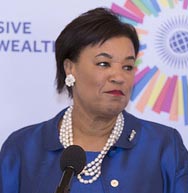Commonwealth Secretary-General Baroness Patricia Scotland said last Friday that the Secretariat supported the just concluded regional anti-money laundering workshop for judges and prosecutors, having recognized the need for judicial independence and integrity.
“The secretariat is absolutely alive to the issue of the independence and the integrity of the judiciary and the legal profession”, she said, before adding that the training done is really important because we need them “objectively to be able to work together and to uphold the rule of law without fear, without favour to anyone.” Baroness Scotland who was speaking at a press conference held at the National Communications Network (NCN) made those comments the very day that this newspaper reported that the Guyana Bar Association (GBA) had objected to the joint training of judges and prosecutors, arguing that this could be seen as impinging on judicial independence. The workshop opened last Thursday and saw Chief Magistrate Ann McLennan and High Court judge Sandil Kissoon along with Director of Public Prosecutions (DPP) Shalimar Ali-Hack and Assistant DPP, Teshana Lake representing Guyana on both days.
The GBA had written to Chancellor of the Judiciary (ag) Yonette Cummings-Edwards on April 25, 2018 objecting to joint training, arguing that it could have the appearance that the judiciary is taking directions from the executive.
During the press conference Baroness Scotland was not specifically ask to address that issue but mentioned it while making a point about the importance of the training.She said that “We have to increase the likelihood that the crooks will be caught. Secondly, we have to relieve them of the burden of their ill-gotten gains, because the two things that they enter into crime for is the money and they think that they wouldn’t get caught, so we have to increase the likelihood that they will get caught and we have to take away all the assets that they illicitly obtain from their corrupt activities”.
She dismissed the perception that money laundering is a victimless crime saying that this is untrue.
This money laundering and fraud and dishonesty, she said, “has victims and the victims are the old, the poor, the disadvantaged and those who are in need of support”. Baroness Scotland noted that similar training has been organized and in other jurisdictions by the international Financial Action Task Force (FATF) bodies to provide understanding on the implementation of the Anti-Money Laundering and Countering the Financing of Terrorism (AML/CFT) legislation in fulfilling the requirements of the fourth round of mutual evaluation.
Detailed discussions on judicial and prosecutorial functions in this area, she said have been conducted for and among the judges and the prosecutors separately. “So the judges have been talking on one side, the prosecutors are talking on the other side. They are in the same place (and) so we can share information”, she stressed.
She noted that it is very important that both sides freely discuss amongst themselves “what their different roles are and how they could make what we have, a justice system that is fair, open and well-resourced. This opportunity is really important because the Commonwealth is here to facilitate”.
She informed that a toolkit based on the Latimer House Principles has been created in the Commonwealth Secretariat, relating to judicial independence which has been developed over a period of time to ensure “the harmonious balancing of power and the interaction between Parliament, the executive and the judiciary in our democratic societies and maintaining that”. She said that the just concluded training covered a broad spectra of international requirements of implementing AML standards,
According to the Dominican-born Baroness Scotland, the discourses at the workshop centred on the possible creation of a Commonwealth implementation toolkit which will be a step by step guide for investigators, prosecutors and judges.






